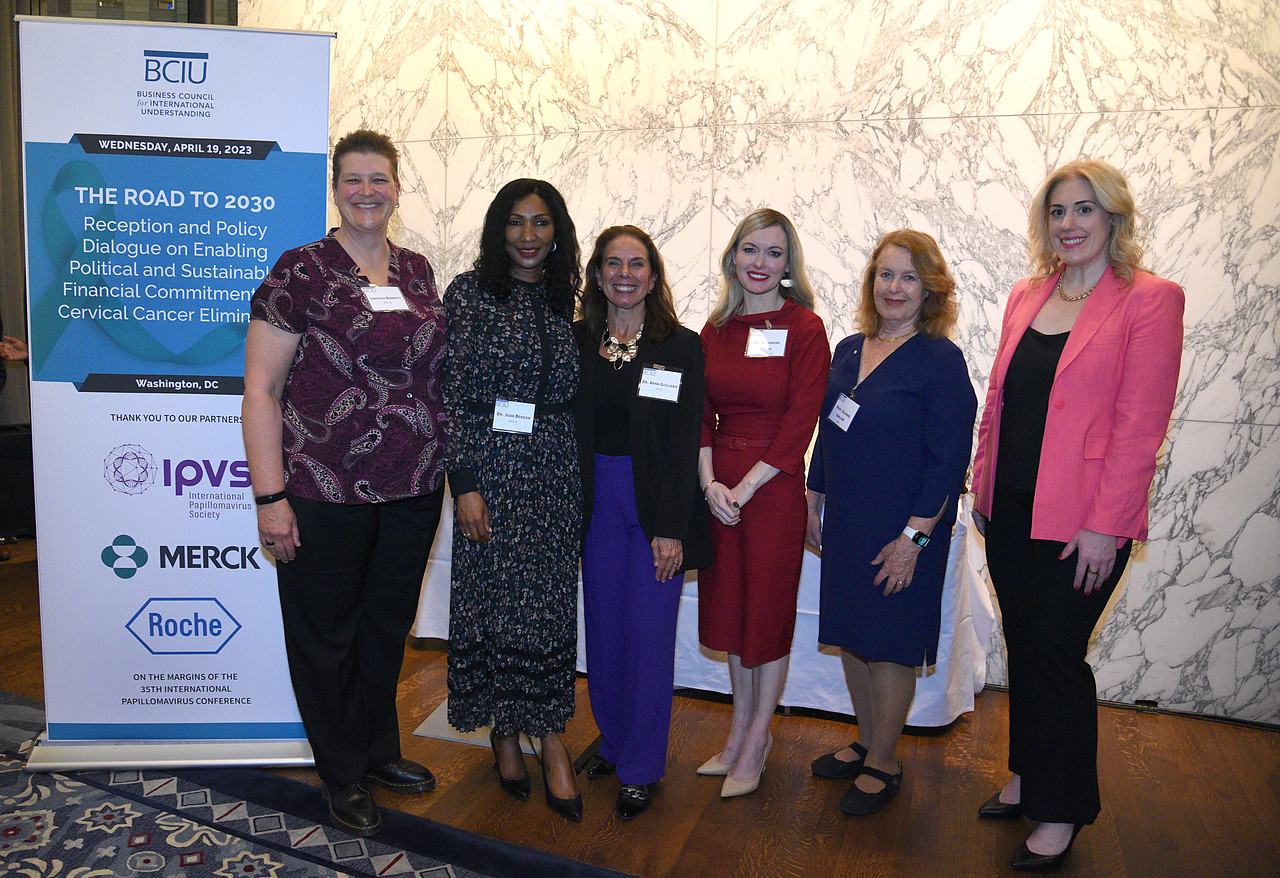Article
BCIU, the International Papillomavirus Society, with Co-Sponsors Merck and Roche, Host a Signature Discussion on Cervical Cancer and HPV Elimination During the International Papillomavirus Conference

On Wednesday, April 19, BCIU, the International Papillomavirus Society (IPVS), Merck (Rahway, NJ, USA, known as MSD outside the United States and Canada) and Roche hosted a timely discussion in Washington, DC during the 35th International Papillomavirus Conference on the need to eliminate cervical cancer. The groups together called on global policymakers to support cervical cancer elimination programs, and increase public awareness on the benefits of vaccination against human papillomavirus (HPV), along with the importance of early and accurate screening and diagnosis.
Achieving these goals will require increased and sustained resource allocation. “President Biden and First Lady Dr. Jill Biden reignited the Cancer Moonshot to end cancer as we know it,” said Dr. Catharine Young, Assistant Director for Cancer Moonshot Engagement and Policy at the White House. “To achieve that goal, we are working to build a world free from HPV-related cancers – through getting more young people vaccinated for HPV and making it easier to get screened in the U.S. and globally. It’s going to take all of us, working together to achieve this ambitious goal, but the reality of eliminating HPV-related cancers, like cervical cancer, is within our reach.”
The event, “The Road to 2030: Policy Dialogue on Enabling Political Will and Sustainable Resource Commitments to Cervical Cancer Elimination,” convened senior government officials, private sector innovators, civil society, multilateral organizations, patients, cervical cancer survivors, and researchers working in partnership to accelerate progress on this issue. The discussion highlighted the urgency to act.
Every two minutes another woman dies from this disease. “We have the tools to eliminate cervical cancer to make it a rare disease globally and need to act now with vaccination of young girls and boys, affordable and accurate cervical screening, and treatment for those with disease,” said Professor Suzanne Garland, President of IPVS. The event also highlighted the need to implement systematic approaches to elimination including HPV vaccination, cervical cancer screening and new, rapid, and cheaper diagnostics and treatment.
“Eliminating cervical cancer requires political support, sufficient and sustainable funding, and equitable access to preventive tools such as screening and diagnostics,” said Roche Diagnostics’ Vanessa Bennett. “We must ensure that every woman and person with a cervix can access information and resources for this preventable and treatable disease. By investing in strengthening health systems and breaking barriers to existing interventions, we can achieve the WHO’s elimination target.”
Broad access to HPV vaccination, early and accurate cervical screening and diagnosis, especially in cancer care, is essential to help people live healthier lives. “Only through collective and broad actions will we be able to drive a strong sense of urgency around the WHO’s goal of Cervical Cancer Elimination,” said Merck’s Dr. Joan Benson. “We are committed and very proud to be a part of that fight.”
With the adoption of the WHO Global Strategy to Accelerate the Elimination of Cervical Cancer, there is renewed opportunity to advocate for equitable access to cervical cancer prevention tools and increased momentum to unite stakeholders behind common goals. “BCIU cares deeply about improving women’s health and is committed to bringing together stakeholders to address the challenge of cervical cancer from all sides: screening, vaccination, education, and funding,” said Caitlin Noone, Chief Operating Officer at BCIU. “Global partnerships between companies, governments, NGOs, and civil society are essential to creating momentum for sustained progress on this critical issue.”
The 35th International Papillomavirus Conference & Basic Science, Clinical and Public Health Workshops (IPVC 2023) gathers researchers, clinicians and other health professionals to share knowledge and ideas on papillomaviruses and their associated diseases, from basic science to global health impact. The theme of this year’s conference is “Coming Together for HPV Elimination.” Said Dr. Anna Giuliano, President-Elect of IPVS, “We are moving from science, to policy, to action in order to save lives using evidence-based approaches.” According to the Union for International Cancer Control, in 2018, over 600,000 women were diagnosed with cervical cancer worldwide and about 340,000 women died from the disease – approximately a quarter of these deaths (22.5%) occurred in Africa.


